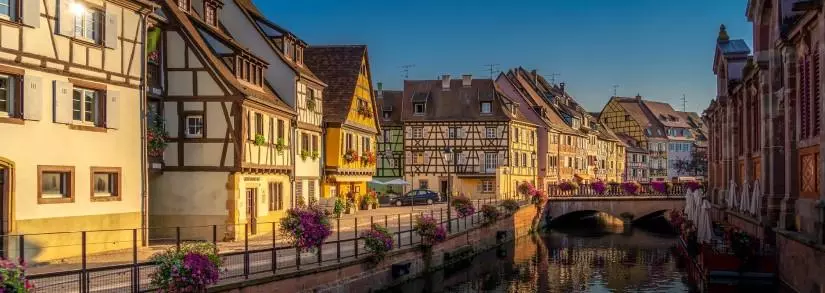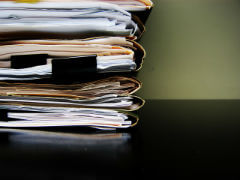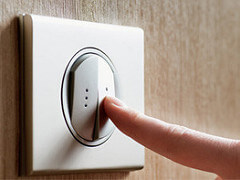Moving to France: How to Set Up Visas, Bank Accounts, Housing & More

Want to subscribe to a French energy offer?
Our English-speaking Selectra advisors are here to help you find the right energy plan.
(foreign IBANs accepted) at [email protected]. You can contact us also:

Moving to France? Find out what you need to do to get all the basics set up in our guide.
Please keep in mind that the information in this article is for informational purposes only. Check with your local French consulate for answers to any particular questions or advice.
Be sure to also check out this Moving to France Checklist, which recaps all the steps to follow before you start your new life in France!

Just arrived in France?
Connect your utilities in one call with Selectra's English-speaking advisers, free of charge!
Before You Arrive: Visas and Paperwork
You can find detailed information about applying for a Visa for France in this other linked article.
Whether you intend to come to France for work, studies, or just to live, if you are planning to stay here for the long term (more than three months), you may need to apply for a long-stay visa (visa de long séjour).
Do I Need a French Visa?Nationals from EU/EEA/Switzerland do not have to apply for a long-stay visa to stay and work in France for longer than three months (though Croatian citizens must still request authorization to work at this time). Nationals of Andorra, Monaco, San Marino, and the Vatican also do not have to apply for a long stay visa
For nationals of most countries outside of Europe, if you plan on staying more than three months in France, you will need to apply for a long term visa from the French consulate or embassy of your country of residence. There are several types of long-stay visas, depending on your situation (employed, student, relative of someone living in France, etc.), but the most common type of long-stay visa is the VLS-TS.
- You may be able to apply for a long-stay visa (VLS-TS) if you are:
- Already employed by a company in France (at least a year-long contract is mandatory);
- A temporary worker (with a contract between 3 months and a year);
- A scientific researcher;
- A student or an intern;
- The spouse of a French citizen;
- The spouse of a foreign national living legally in France (wishing to reunite)
- Coming to France as a visitor (but not working) with sufficient funds to live off during your stay.
If none of these situations apply to your case, or for more information, check the official French administration website (you can find more information about visas - in French).
Moving to France from the UK?Find out all you need to know about the process, pre and post Brexit in this dedicated article on moving to France from the UK.
Working in France
If you are not an EU/EEA national and wish to come to France to work, you will likely need to already have a contract signed with an employer in France before your arrival in France. To avoid problems and delays, you should start the visa application process as soon as possible; the visa process may take up to several months.
Nationals of certain countries who are under the age of 30 may be able to apply for a one year working holiday visa. Check with the local French embassy in your country of residence, or find out about which countries have working holiday agreements with France (in French)
Moving to France from the USA?Find out all about how to proceed, from your visa to healthcare in this guide dedicated to moving from the US to France.
Renewing Your Visa: How to get a residence permit for France?
In most cases, the VLS-TS is valid for one year. If you wish to stay in France for longer and if you still meet the eligibility requirements for a visa, you will need to go the préfecture (police headquarters) and apply for a renewable residence permit at least two months before your visa's expiry date. You will have to provide information such as your financial resources, health insurance, employment contract, family situation, and proof of your address in France. The duration of your permit depends on your study/employment status and your family situation. Residence permits are generally one-year renewable but permanent residence permits go up to 10 years.

Need to show proof of address?
An energy account in your name is one of the simplest ways to verify your address or justificatif de domicile. Call Selectra's English-speaking advisors to help you open up an energy account in your name.
Moving to France from an English-speaking country?You can check out these detailed articles about moving to France from the US, from Canada, from the UK and from Australia.
Opening a Bank Account in France
You can open a bank account in France if you are planning to stay in France for three months or longer. Some banks even offer a compte non-résident, for those who are not planning to be French residents. You will need a French bank account and IBAN to set up energy service and to get a mobile phone and Internet plan.
- You will need the following documents to open a bank account account in France:
- Proof of identity (an ID card or a passport);
- Proof of residence, if you are not an EU citizen (i.e. your visa);
- Proof of a French address (e.g. an energy bill);
- Proof of earnings and status (employment contract, a student card etc.);
- A birth certificate (sometimes)
Although your bank account can be activated in a day, credit cards and cheque books generally arrive a couple of days (up to 10) after that. You may be charged for some banking services such as the use of your credit card or a secure Internet access to your savings and earnings.
Moving to a New Home in France
Find more detailed information about househunting in France in our guide and finding student accommodation in France in this other guide.
Properties for rent in France can be found online (check websites like Appartager, Particulier à Particulier, LiveOnRiviera, or SeLoger), through real estate agents, by word of mouth, or through French expat network sites. Depending on which city or town you are looking to live in France, finding a place to rent may be relatively easy or quite stressful. Don't forget to use common sense and follow your gut when searching online - if an announcement seems too good to be true, it probably is! Never send money before you have signed a rental agreement.
Rental Dossier

Your dossier is an important element in your apartment search
Finding a place to rent in larger cities such as Paris can be very competitive. French landlords may require a certain amount of paperwork (known as a dossier) from prospective tenants, which may include:
- Proof of identity (passport)
- Proof of earnings and employment status (employment contract, tax filings from the year before, salary slips)
- Proof of sufficient resources
- Copy of your RIB (bank account details - see above)
Particularly for students, it is fairly common practice in France that landlords ask for a "garant", which is someone who makes more money than you and will agree to pay rent on your behalf should you ever miss a month. The guarantor is usually required to provide proof of their employment/resources, along with a letter confirming their agreement to guarantee rent for the renter. Many landlords prefer a French guarantor, though some may accept one living abroad.
The maximum deposit amount a landlord is allowed to ask is for the equivalent of one month's rent, "charges" (utilities) not included, for unfurnished apartments. There is no maximum deposit amount fixed by law for furnished apartments.
Lease and Rental Agreements
The "bail" stipulates the terms and conditions of your rental agreement, including rental rates, term, etc. The bail must include the owner's name and address (including those of the agent, if one has been used), contract start and end dates as well as the length of the term, rental amount & terms allowing for increase (if applicable), deposit amount, type of dwelling (i.e. appartment, house, etc), and description of the property.
Etat des lieux
Before signing the bail, the landlord and tenant should also draw up an "état des lieux" (inventory and condition report) at the beginning and the end of an accommodation contract, by mutual consent.
There should be two copies of the état des lieux (one for the tenant, the other for the landlord). The inventory can be done by private agreement between the landlord and the tenant (or by a designated third party such as a real estate agent), or by a judicial officer. The états des lieux reports must describe the accommodation and its equipment (appliances, fittings) in detail. It should also include a meter reading of individual heating systems or hot water tanks, if the property has them.
The états des lieux is important because it is assumed that the accommodation otherwise was in good shape, which can be problematic if something goes wrong. Any disputes about it should be referred to the conciliation commission (CDC). If the conciliation does not succeed, you can proceed to court.
As a tenant, you have 10 days after the start date of your contract in which you can request for a modification to état des lieux if you notice something about the state of the accommodation and/or its fittings. You may also make a change to the état des lieux during first month of the heating season if you have a concern about the heating system. You have the right to call the appropriate authority (the commission départementale de conciliation - CDC) if the landlord refuses to change the états des lieux.
Find out more about the état des lieux in our guide.
Household Insurance
Tenants are required by French law to have household insurance to cover the property. Household insurance will cover things like broken windows, theft/vandalism (usually to set amounts), fire damage, weather-related risks, etc.
Taxe d'habitation
When it comes to taxes in France, the taxe d'habitation covers the costs of local area services (street cleaning, rubbish removal, etc). As a tenant you are responsible for the taxe d'habitation for the property you are renting. The amount depends on the size & location of the property, as well as the socio-economic profile of the habitant (exemptions are made for low-income/pension age French residents).
Driving in France
Whether you will be staying in France just for a short period of time, planning a roadtrip around Europe or permanently moving to a new home on the French territory, you will need to be aware of the national driving regulations. These include laws, roadsigns, documents and items to carry which may all differ from what you are used to in your country of origin.
Find out all about driving in France in this dedicated article.
Voting in France
Discover all you need to know about how to vote in France as an expat in person or by proxy this dedicated guide.
Activating Utilities: Phone & Internet

Looking for a Mobile Phone or Internet Plan in France?
Contact Selectra's English-speaking advisers to help you set up the right plan for you.
As a tenant you are often responsible for setting up Internet service yourself, and if you're planning on staying in France for three months or more, it is definitely worth setting up a French cell phone plan. You will also need a French phone number if you are responsible for setting up electricity and gas for your home.
Most French phone companies offer both contracted plans (often 12 months or more), or contract-free (sans engagement) plans, and you can often save money by setting up an internet and phone plan together.
You will need a French bank account (with an IBAN) to subscribe. Note that an Internet box usually takes 7-10 days to be shipped.
Activating Utilities: Electricity and Gas
Find more detailed information about French utilities in our ultimate guide to setting up utilities in France!

Ideally, you should start the electricity and gas activation service process about two weeks before moving in. This allows enough time for you to verify whether electricity and/or gas has been deactivated to your new home and for a technician to reactivate the line(s). If you own a propane gas tank, you may need to fill the tank. Keep in mind that if your accommodation is newly built, you may need to connect it to the distribution network.
That being said, starting energy service will be difficult if you don't already have a French bank account and phone number, so focus on getting those out of the way first!

Connect Electricity and Gas in France!
Selectra's English-speaking advisors will help you compare, subscribe and save on your electricity and gas plans.
Setting Up Electricity

The power distribution network (the grid) is owned and operated by the ERDF. ERDF responds to power outages and downed lines, but in order to have electricity service you must open an account with an electricity supplier. EDF is the historic and largest supplier in France, though you can often find better deals with other suppliers (which include Total Energies, Planete Oui, eKwateur and others).
To open an electricity account, you need to contact a supplier and provide them some basic information about your accommodation (heating system, cooking appliance, water tank, etc). If you can, you should also provide the supplier with a meter reading along with the previous occupier’s name. ERDF charges a fee to activate your account.
Find out more about activating an electricity account with our step-by-step guide to starting electricity service in France.
Setting Up Gas Service

GRDF is the major gas distribution network operator for most of France. As is the case with electricity, customers must open an account with an energy supplier to have gas service. Gas suppliers are responsible for providing gas supply, billing, and other customer service. Some suppliers propose dual offers (gas and electricity) which can often deliver energy savings.
Check out our guide to setting up natural gas service for more information.
Which energy offer should you choose in France? Some offers are more competitive than others. Think about comparing prices!
| French Term | English Translation | French Term | English Translation |
|---|---|---|---|
| Visa long de séjour | Long-stay visa | Préfecture | Prefecture (police headquarters) |
| Compte non-résident | Non-resident's account | Relevé d'Identité Bancaire (RIB) | Bank details |
| Bail | Lease Agreement | Loyer | Rent |
| Garant | Guarantor | Charges | Utilities |
| Etat des lieux | Apartment inventory | Caution | Deposit |
| Sans engagement | Contract-free plan | ||
Not yet completely fluent in French? Our guide on how to learn French can help you start things off!